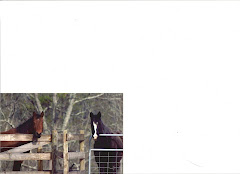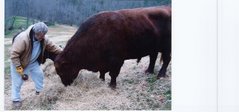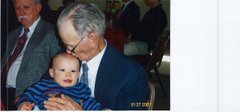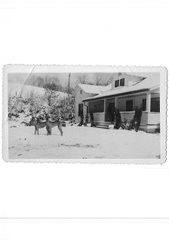My Bible fell open to a series of "begats" this morning. The book is full of family history recited in names. I always wondered why it was so important to record the names of those who had lived and died, one after another. Name after name marches through the pages tracing the history of a people.
Some of those passages provided entertaining reading material back when parents wouldn’t let you take any book but the Bible to church. Did you know Ephraim’s daughter Sheerah built on both Lower and Upper Bethhoron and Uzzensheerah? In the middle of the listing of all the sons and fathers, mothers, daughters and concubine names can be found. All those names, all those families, contain memories of a people’s journey towards God.
Reading the list of begats reminds me that families haven’t changed much through the centuries. Some prospered. Some didn’t. Reuben was the firstborn of Israel but he polluted his father’s couch (isn’t that an interesting detail) so his birthright was given to the sons of Joseph. Some were carried away into exile and others came home. Seled and Jether died childless and Sheshan had only daughters. Jabez, so named because his mother said she bore him in pain, was more honorable than his brothers. There it all is, the good, the bad and the ugly, the story of a family, my family of faith.
I sit here this morning contemplating the list of names for my family and the stories that go with them. We will not be listed in a book read by millions of people nor will our stories survive through thousands of years. My family stories are unique and the same... a paradox that is true for all our family stories. When I tell my children the story of my Grandma’s second sight or how I hated the night time walk to the outhouse, it is my story. You have stories, too, just as interesting and special.
The institutional church, at its best, gives us a place to tell our story. We can be seen and heard, valued for our own special brand of creation. We want to think we are a cut above, someone who stands out in the crowd. Like Jabez, we want to be remembered as more than. The truth is we are also reminded we are not alone or much different from all those who sit beside us in the pews. All of us, even the ones who seem to lead charmed lives free from struggle, have more in common than we know. Some crosses are invisible to the naked eye.
Pauline, the opera singer, and Max, who started an ether factory, begat Irene, Carl, Alvina, Grace and Pauline. Irene, who went to college and became a teacher, and Stuart, a gentle man, begat Margaret, Alvin, his twin who died at birth, and Shirley. Shirley, who worked on the eighth floor in downtown Richmond, married Tommy, a Navy boy from Georgia, and they begat Peggy and Gayle. Peggy, who grew up Baptist, and Michael, a Baptist preacher’s son, begat Megan, Alison and Adam. And the beat goes on... the stories of lives lived well... lives lived with pain and suffering, joy and laughter, sons and daughters, nieces and nephews, cousins to the third degree, loss and gain. Who knew the Bible was so southern? It does matter who your people are. We need to tell their story for by so doing, we tell our story too.
Subscribe to:
Post Comments (Atom)









No comments:
Post a Comment